You've heard the story about Peter Minuit buying Manhattan from the local Indian tribe for $24.00 in 1626. Warren Buffett famously pointed out that if the Native Americans had invested that $24.00 in an account paying 6.5% annual interest, it would be worth more than the entire island today.
Humans are extremely
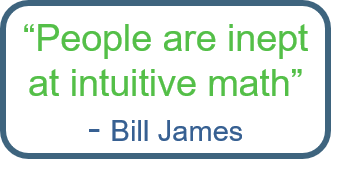
good at estimating "linear" (straight line) growth, but generally unable to fathom compound annual growth. We are wired that way in our DNA. This presents interesting repercussions for business owners and salespeople.
Earning $1 Million per Year
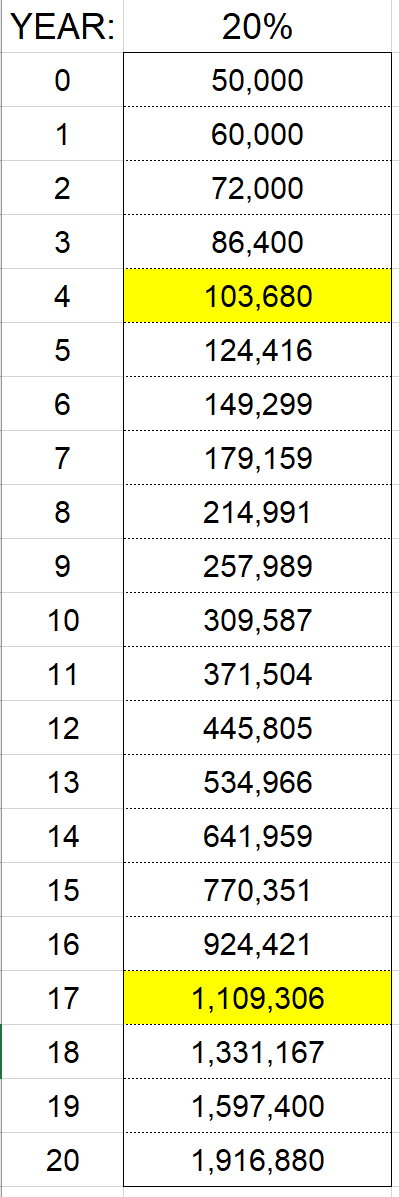
I often give talks to salespeople about the path to earning massive yearly incomes. In some cases, $1,000,000 or more. I get the usual "bobblehead" response which means they hear the words but don't believe it's really possible for themselves.
However, if you start working at $50,000 per year (a fairly typical pay for a college grad) you will be earning $1,000,000 per year before the age of 40, if you increase your income only 20% per year. The table is on the left.
Since most readers earn substantially more than $50K right now, your path would be even shorter. All you need to do is to figure out how to grow your income 20% per year.
20% Growth per Year
Pat Riley tells a story about his 1984 LA Lakers basketball team. The "Run & Gun Lakers" were talented, with stars like Kareem Abdul-Jabbar, Magic Johnson, and James Worthy. Nonetheless, they lost that year to the Boston Celtics in the NBA Championship Finals. The following pre-season, Riley announced the team would need to "improve 20%" in order to win the championship.
Instead of getting better, the team got worse. The players were sloppy and unfocused. Panicked, Riley called an emergency meeting with the team leaders and asked what on earth was causing this. The leaders responded angrily "you don't think we were trying last year?" "We worked as hard as we could". "There's no way we can get 20% better"
Riley realized he had made his goal sound unattainable. He thought about it, and returned the following day with a new message. He asked the team, can you:
- Improve your shooting by 1%?
- Improve your rebounding by 1%?
- Improve your passing by 1%?
- Improve your defense by 1%?
- And so on.....
The players all agreed they could do each of these things easily. The team did get incrementally better, and that year they returned to the finals and won.
The moral to this story? Improving 20% in any area is virtually impossible. Improving 20 things by 1% is reasonable, and leads to the same result. That's why Albert Einstein called compound interest "The eighth wonder of the world".
Exponential Growth
We also underestimate the implications of exponential growth. Nowhere is this more important than in the information technology field, because computing power is growing exponentially.
We have heard of
Moore's Law, which states integrated circuit processing power doubles every 18-24 months. What we don't grasp is how this relentless growth will change things in the future.
Take our napkin example in the beginning. Did you guess the napkin, doubled over 32 times, would be 1,620 miles thick? Your napkin would be about the distance from Washington DC to Denver CO.
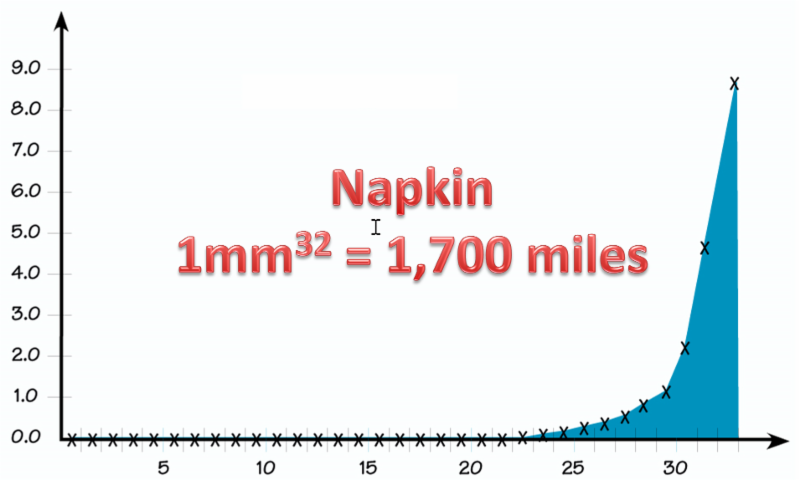
Doubling the napkin another 32 times would make it as large as the Milky Way galaxy!
Futurist Raymond Kurzweil coined the term "
the second half of the chessboard problem". If you double something 32 times (the first 32 squares of a chessboard), and

continue doubling for the next 32 times (second half of the chessboard), the second half is 3 billion times larger than the first half. By the time we notice there's a trend (the first half of the chessboard), it's too late to do anything about it (the second half of the chessboard).
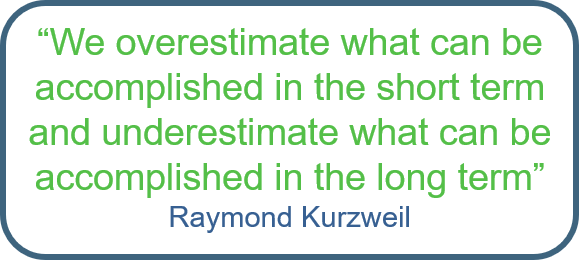
If computing power has grown to it's current state in 65 years, it will be 3 Billion times more powerful in another 65 years. If you think Alexa and Siri are smart know, what will happen when they have 3 Billion times more power? What will this mean for artificial intelligence, machine learning, neural networks and every other I.T. technology?
It means cha-ching for
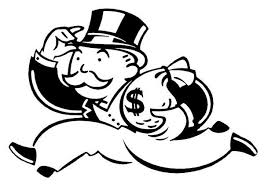
those of us selling it!
If you think the I.T. business has changed a lot in the last ten years, just wait until the second half of the chessboard kicks in. You ain't seen nothin' yet!